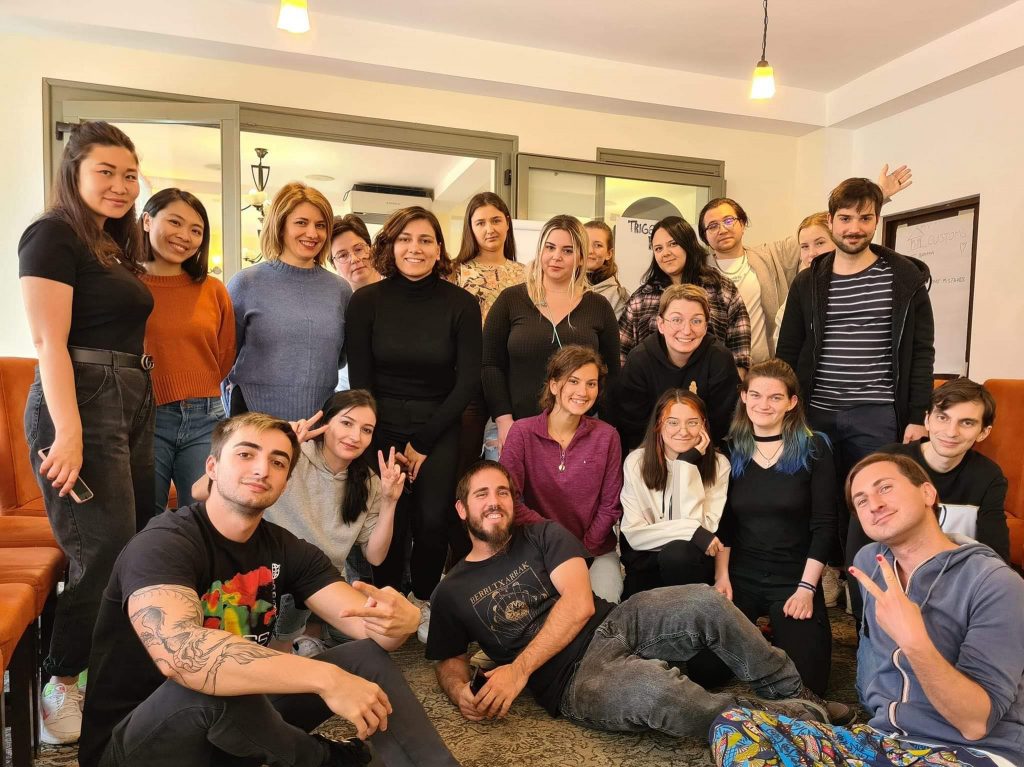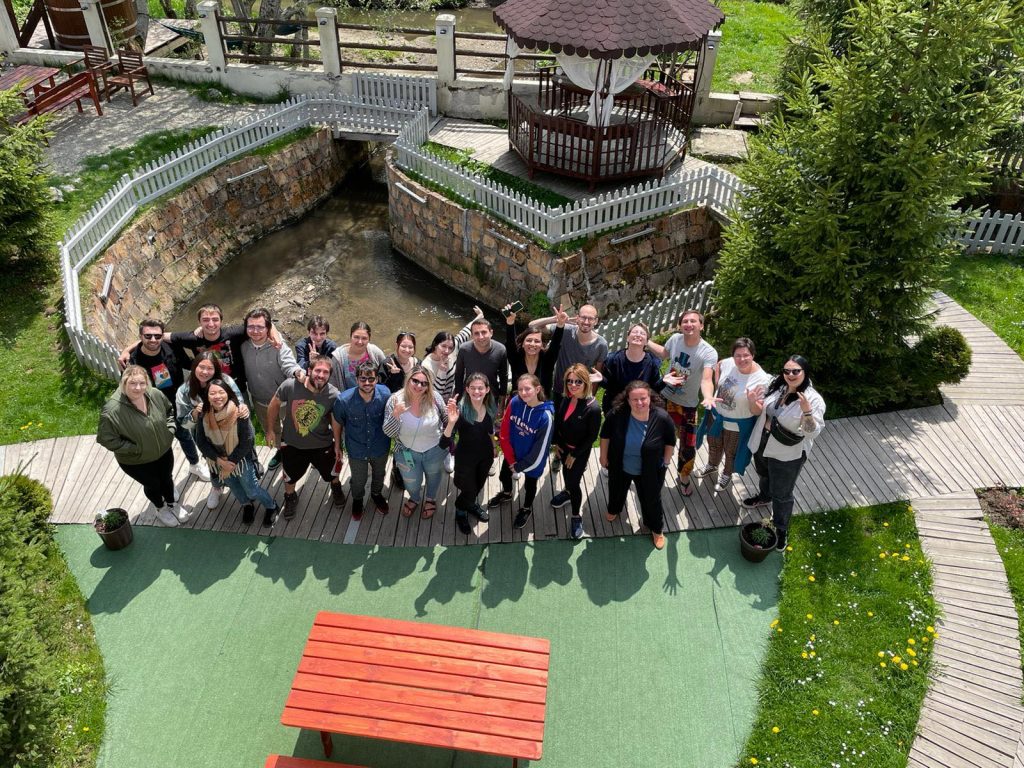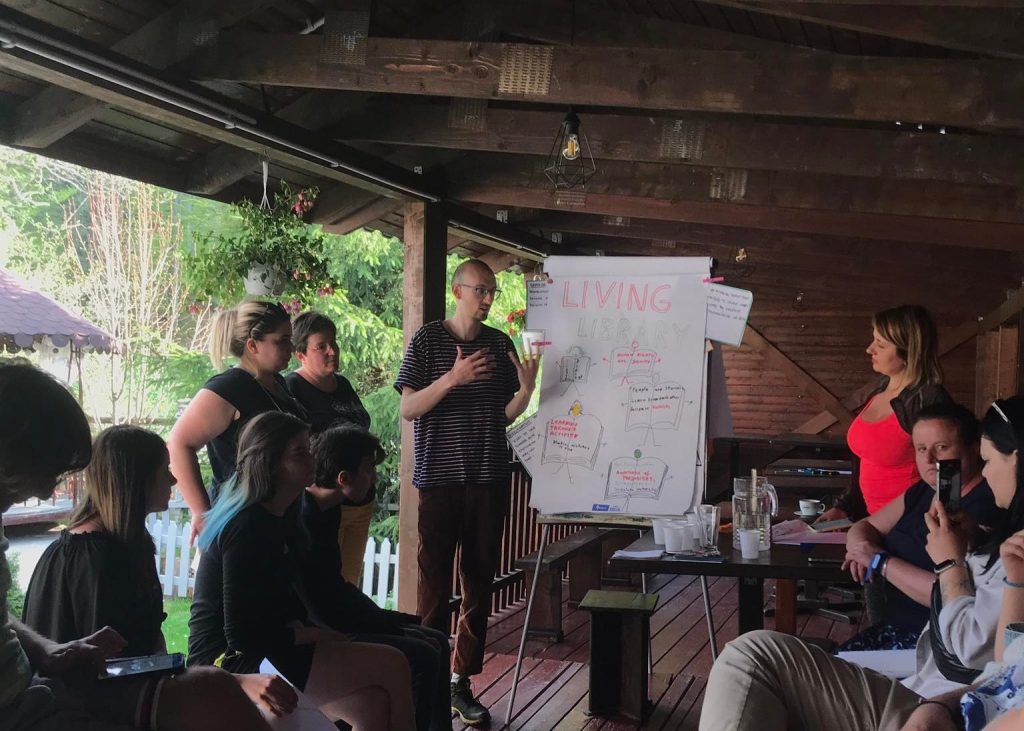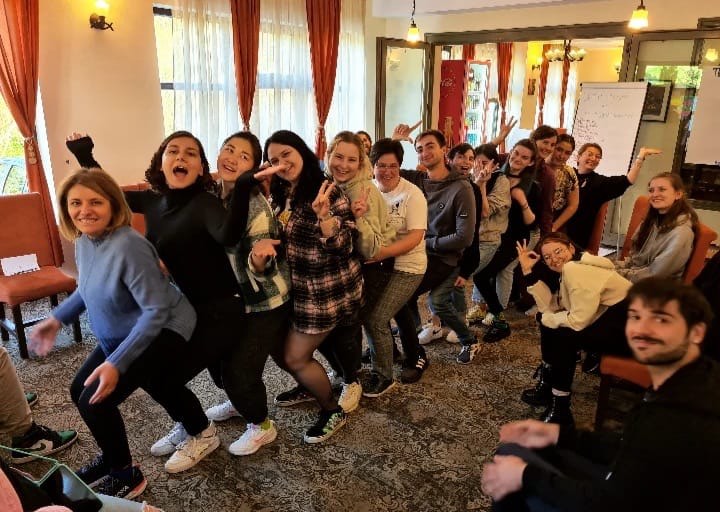PT
O curso de formação reuniu 28 jovens trabalhadores de diferentes cantos da Europa: Portugal, Espanha, Grécia, Polónia, Itália e Roménia. Trouxemos curiosidade, criatividade e preparámo-nos para aprender mais sobre como abordar os jovens com menos oportunidades (obstáculos sociais, económicos e geográficos, deficiência, dificuldades educacionais, diferenças culturais, problemas de saúde), e para os envolver em actividades para jovens.
Foi uma experiência de aprendizagem enriquecedora e um momento de mudança de vida, e aprendemos muito sobre nós próprios, sobre os outros e sobre o mundo. Cada dia criámos um espaço onde nos sentimos inspirados. A viagem ao longo da semana começou com poucas actividades que nos ajudaram a estar mais próximos e a conhecer melhor todos, todas as actividades foram feitas utilizando métodos de educação não formais. Primeiro, partilhámos com os outros a história dos nossos nomes e também, criámos algumas linhas, sem falar, de acordo com o nome, a idade, a experiência em Erasmus+ e na educação não-formal. Experimentámos a caminhada de consentimento e ficámos surpreendidos com o número de abraços que partilhámos, mesmo que nos tivéssemos encontrado apenas um dia antes pela primeira vez. A missão impossível em 60 minutos ajudou-nos a construir a nossa grande equipa. Os dias seguintes estavam cheios de novas informações sobre as pessoas com menos oportunidades, à medida que tentávamos estar no seu lugar e perceber a situação em que se encontravam. Aprendemos e discutimos sobre o “HATE PYRAMID” que mostrou a importância de categorizar atitudes e acções de ódio e de não colocar tudo na mesma “caixa” também vimos que todos têm perspectivas diferentes em relação a situações específicas. Encerramos os nossos seminários de formação aprendendo sobre educação não-formal com diferentes métodos, tais como a acção vinculada, teatro labiríntico, teatro de fórum, biblioteca viva e método de voz fotográfica.
Depois de todas estas sessões, compreendemos melhor o tema relacionado. Os jovens com menos oportunidades são jovens que estão em desvantagem em relação aos seus pares porque enfrentam uma ou mais das situações e obstáculos. Em certos contextos, estas situações ou obstáculos impedem os jovens de ter acesso efectivo à educação formal e não formal, à cidadania activa e à inclusão na sociedade em geral. Como trabalhadores juvenis, temos de construir pontes para estes jovens através de projectos de inclusão social. Primeiro, é importante descobrir as suas necessidades e interesses, o ambiente em que vivem, os lugares onde passam o seu tempo, os problemas que enfrentam, o que esperam do futuro, o que lhes podemos oferecer. Construir a confiança dos jovens com quem começamos a trabalhar é o passo mais importante. Um dos critérios mais importantes para assegurar a qualidade do trabalho dos jovens é dar aos jovens um papel activo em todas as actividades durante toda a duração do projecto em todas as fases, de acordo com o seu interesse e possibilidades.
EN
The training course gathered 28 youth workers from different corners of Europe: Portugal, Spain, Greece, Poland, Italy and Romania. We brought curiosity, creativity and prepared ourselves to learn more about finding ways to approach young people with fewer opportunities (social, economic and geographical obstacles, disability, educational difficulties, cultural differences, health problems), and to involve them in youth activities.
It was an enriching learning experience and a life-changing moment, and we learned a lot about ourselves, about others and about the world. Each day we created a space where we felt inspired. The journey throughout the week started with few activities helping us to be closer and knowing everyone better, all activities were made using non-formal education methods. First, we shared with the others the story of our names and also, we created some lines, without speaking, according to the name, the age, the experience in Erasmus+ and in non-formal education. We experienced the consent walk and we were surprised by the number of hugs we shared, even if we just met one day before for the first time. Mission impossible in 60 minutes helped us to build our big team. Next days were full of new information about the people with fewer opportunities, as we tried to be in their shoes and realize the situation that they are being to. We learned and discussed about the “HATE PYRAMID” that showed the importance of categorizing hateful attitudes and actions and not to put everything in the same “box” as well we saw that everyone has different perspectives of regarding specific situations. We closed our training seminars learning about non-formal education with different methods such as action bound, labyrinth theatre, forum theater, living library and photo voice method.
After all these sessions, we understood better the related topic. Young people with fewer opportunities are young people that are at a disadvantage compared to their peers because they face one or more of the situations and obstacles. In certain contexts, these situations or obstacles prevent young people from having effective access to formal and non-formal education, active citizenship and inclusion in society at large. As youth workers, we have to build bridges for this young people through social inclusion projects. First, it is important to discover their need and interest, environment they live in, places where they spend their time, problems they face, what they expect from the future, what we can offer to them. To build the trust of young people with whose we start to work is the most important step. One of the most important criteria how to ensure the quality of youth work is giving to young people active role in all activities during whole duration of the project in all phases according to their interest and possibilities.
 Erasmus+
Erasmus+ 



